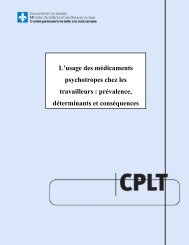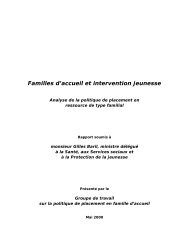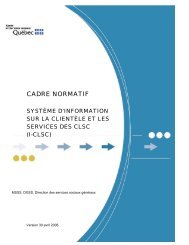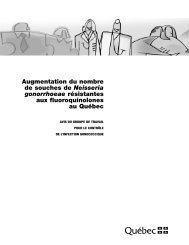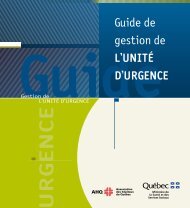De l'innovation au changement - Gouvernement du Québec
De l'innovation au changement - Gouvernement du Québec
De l'innovation au changement - Gouvernement du Québec
Create successful ePaper yourself
Turn your PDF publications into a flip-book with our unique Google optimized e-Paper software.
Projet 15<br />
Quality of Outpatient Geriatric Psychiatric Consultation :<br />
do referring consultant physicians and patients agree , région de Montréal<br />
Évaluation <strong>du</strong> processus de consultation externe en psychiatrie gériatrique pour les patients âgés déprimés: perspective <strong>du</strong><br />
patient, de sa famille, <strong>du</strong> médecin référent et <strong>du</strong> médecin<br />
1. CLIENTÈLE VISÉE Tous les patients de 65 ans et plus référés à la clinique externe de psychiatrie gériatrique de l’Hôpital St-Mary’s. L’intervention vise<br />
spécifiquement les patients référés pour dépression et <strong>au</strong>tres troubles psychogériatriques (anxiété et déficits cognitifs).<br />
2. BUDGET ALLOUÉ 35 000$<br />
Type de projet : Le rapport final parle d’une évaluation, mais il s’agit avant tout d’une étude descriptive.<br />
3. CONTEXTE D’ÉMERGENCE<br />
3.1 Pourquoi le <strong>changement</strong> La prévalence de la dépression majeure chez une population âgée dans la commun<strong>au</strong>té est de 6%. Cependant, moins de 20% de ces<br />
patients déprimés reçoivent un diagnostic et un traitement adéquat. Ces patients âgés déprimés sont le plus souvent isolés et non<br />
motivés à obtenir de l’assistance <strong>du</strong> CLSC ou des ressources commun<strong>au</strong>taires. En plus de leur p<strong>au</strong>vre qualité de vie, la dépression<br />
représente un risque important de co-morbidité à c<strong>au</strong>se d’une alimentation et d’une hydratation médiocres, une fidélité douteuse à la prise<br />
de leurs médicaments et une négligence accrue face à leurs problèmes médic<strong>au</strong>x. Un tel état accroît l’utilisation inappropriée des<br />
ressources hospitalières (urgence, soins médic<strong>au</strong>x et psychiatriques) lorsque le patient se présente ou est finalement porté à l’attention<br />
des intervenants.<br />
3.2 Principales caractéristiques This study is expected to contribute in an innovative fashion (evaluation of the intervention) to the consultation model between primary care<br />
physicians and psychiatrist; (this model is at the center of the “virage ambulatoire”) by: 1) provision of an adequate description of the<br />
process and its problems/limitations; and 2) clarification of potential obstacles in the consultation process (desire by the primary care<br />
physician to refer again; the desire of the patient/family to actually see a psychiatrist they are referred to by their primary care physician;<br />
the ability of the primary care physician to effectively manage the elderly depressed patient in the community).<br />
Le projet vise à faciliter et à améliorer la participation <strong>du</strong> médecin expert dont l’opinion est requise par le médecin de famille pour mieux<br />
l’aider à traiter ces patients et utiliser <strong>au</strong> mieux les ressources disponibles, donc une meilleure consultation entre le médecin de famille et<br />
le psychiatre gériatrique.<br />
This study will enable the project team to gather information on: 1) how the consultation process is perceived by the primary care<br />
physician, the patient/family and the psychiatrist; 2) potential problems in communication between physicians (primary care and specialist);<br />
3) the eventual implementation of recommendations.<br />
3.3 Objectifs de l’évaluation Ce projet vise à évaluer une intervention qui facilite l’intégration des services pour les personnes âgées déprimées à risque entre les<br />
milieux suivants : l’hôpital (clinique externe), le CLSC, le bure<strong>au</strong> <strong>du</strong> médecin de famille référent ; et entre les intervenants que sont les<br />
médecins de famille et psychiatres spécialisés en psychiatrie gériatrique. Les objectifs spécifiques visent : 1) To describe the sociodemographic<br />
profile of the patients referred for consultation. 2) To describe the reasons for the referral and the expectations from the<br />
consultation from the perspectives of the patient/family, the referring physician and the psychiatric consultant. 3) To assess the referring<br />
physician’s perceptions of the consultation 1-month post-consultation (type of consultation, reason for referral and implementation of<br />
recommendations). 4) To assess the level of satisfaction by the patient/family immediately after the consultation.<br />
77





